The 2nd Joint Myanmar-Thai NLP/AI R&D Workshop
The 2nd Joint Myanmar-Thai NLP/AI R&D Workshop
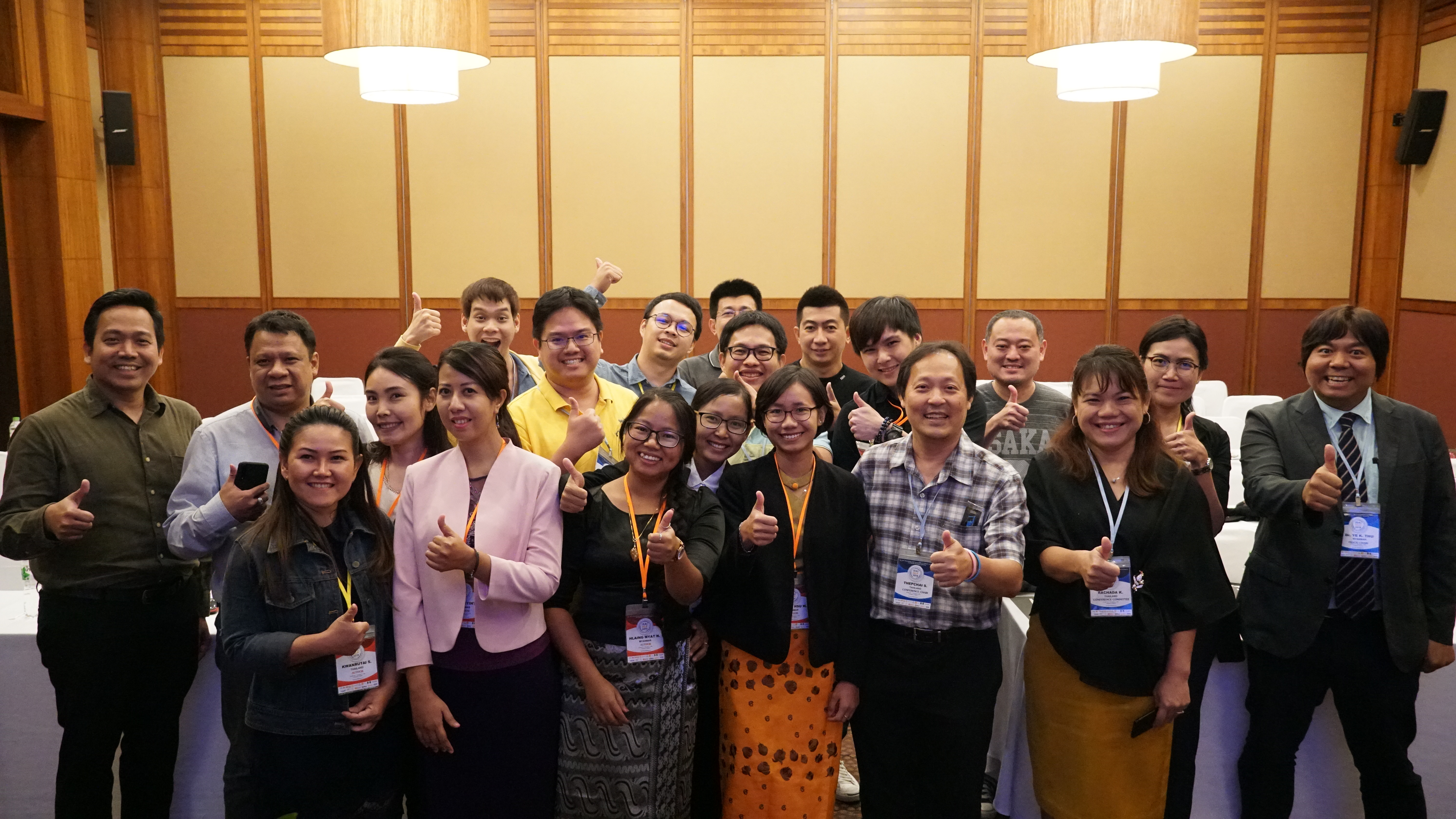
We are pleased to announce the 2nd joint Workshop on NLP/AI R&D which will take place in Bangkok, Thailand, from Nov 18 to 20, 2020. It will be colocated with iSAI-NLP 2020. The workshop will bring together researchers, professors and students in NLP and AI. The aim of the proposed workshop is to bring together the community of ASEAN researchers interested in these areas.
Because of the COVID19 pandemic, the situation in the coming months is very uncertain. And thus, we are also making parallel contingency plans for a fully virtual conference if necessary.
We invite submissions on topics that include but are not limited to the following:
NLP R&D:
- POS-tagging
- Tokenization
- Named entity recognition (NER)
- Morphological analysis
- Chunking
- Disambiguation
- Machine Translation (MT)
- Automatic Speech Recognition (ASR)
- Text to Speech (TTS)
AI R&D:
- Statistical Learning
- Machine Learning
- Deep Learning
- AI in image and speech processing
- Bayesian Machine Learning
- Graph Neural Networks
- Meta Learning
- Reinforcement Learning
- Adversarial Machine Learning
Paper Submission Instructions
Deadline:
Submission Deadline : October 26, 2020
Notification of Acceptance : November 2, 2020
Camera ready : November 9, 2020
Paper length:
6-10 pages including figures, tables references.
Submission Format:
Papers must be prepared under JIIST format as shown in the link below: https://jiist.aiat.or.th/page/authorGuide
Submission System:
The papers must be submitted via the email address: yktnlp@gmail.com
Review Process
For papers that are accepted for review, program committee (PC) members will be matched to submissions based on research expertise and interest. Authors will have a limited opportunity to respond to initial reviews. This author feedback will then be taken into account in the final recommendations and reviews may be changed accordingly.
Journal Opportunities
A select set of rated papers may be nominated for fast track reviewing at the Journal of Intelligent Informatics and Smart Technology (JIIST).
Workshop Date
November 20, 2020
Conference Registration and Attendance
At least one author is required to register for the conference to present the paper, and we encourage all authors to attend if possible.
For the workshop presenters, please select “Full Registration for Participant” (2400 baht). That will cover the whole iSAI-NLP conference.
Program Co chairs
Ye Kyaw Thu (NECTEC, Thailand)
Thepchai Supnithi (NECTEC, Thailand)
Nattapol Kritsuthikul (NECTEC, Thailand)
AIoT Track 1: Artificial Intelligence (AI) Fundamentals
AIoT Track 1: Artificial Intelligence (AI) Fundamentals
- Adaptive Control
- Agent and Multi-Agent Systems
- Artificial Neural Networks Spiking
- Artificial Neural Networks
- Bayesian Models
- Biologically Inspired Neural Networks
- Architectures Interacting with The Brain
- Convolutional Neural Networks
- Deep Learning
- Big Data, Distributed AI Systems and Architectures
- Evaluation of AI Systems
- Evolving Systems – Optimization, Affective Computing
- Grid-Based Computing
- Knowledge Acquisition and Representation
- Knowledge Engineering, Machine Learning
- Multi-layer Perceptron, Multilayer Perceptron and Kernel Networks
- Learning and Adaptive Systems
- Mathematical Foundations of AI and Intelligent Computational methods
- Media Machine Learning in Engineering
- Natural Language Processing
- Object and Face Recognition, Ontologies, Reasoning Methods
- Particle Swarm Optimisation
- Planning and Resource Management
- Planning and Scheduling
AIoT Track 2: AI Applications
AIoT Track 2: AI Applications
- Autonomous and Ubiquitous Computing
- Biomedical systems
- Bioinformatics Coding
- Collective Computational Intelligence
- Color/Image Analysis
- Computer Vision
- Crisis and Risk Management
- Data Fusion
- Data Mining and Information Retrieval
- Decision Support Systems
- Deep Learning
- Real Time Systems
- Social Networks
- eBusiness
- eCommerce
- eHealth
- eLearning
- Engineering and Industry
- Expert Systems
- Finance and AI
- Fuzzy Logic and Systems
- Genetic Algorithms and Programming
- Human-Machine Interaction
- Intelligent Real Time Monitoring and Control
- Knowledge Management
- Cybersecurity, ForensicsBioMedical
- Medical Informatics and Biomedical
- Movement and Motion
- Multimedia Computing
- Multimedia Ontologies
- Multimedia
- Political Decision Making
- Project Management Recommendation Systems
- Recurrent Neural Networks and Reservoir Computing
- Robotics and Virtual Reality
- Signal and Image Processing
- Knowledge Extraction
- Smart Graphics
- Smart Grids
- Social Media and AI
- Speech and Natural Language Processing
- Speech Synthesis
- Time Series and Forecasting
- Mining and Exploratory Analysis
AIoT Track 3: AI and Social Issues
AIoT Track 3: AI and Social Issues
- AI and Ethical Issues
- Cybersecurity and AI
- Deep Learning and Big Data Analytics
- Deep Learning and Cybersecurity
- Deep Learning and Forensics
- Forensic Science
- Intelligent Profiling and Personalisation
- Machine Learning and Social
- Social Impact of AI
AIoT Track 4: Embedded Systems
AIoT Track 4: Embedded Systems
- Multiprocessors
- reconfigurable platforms
- memory management support
- communication
- protocols
- network-on-chip
- real-time systems
- embedded Microcontrollers
- Real-time systems: real-time related aspects such as software, distributed real-time systems, real-time kernels, real-time OS, task scheduling, multitasking design
- Embedded hardware support: System-on-a-chip, DSPs, hardware specification, synthesis, modeling, simulation and analysis at all levels for low power, power-aware, testable, reliable, verifiable systems, performance modeling, validation, security issues, real-time behavior and safety critical systems
- Embedded software: memory management, object-oriented aspects, virtual machines, scheduling, concurrent software for SoCs, distributed/resource aware OS
- OS and middleware support: Hardware/software
- co-design: Methodologies, test and debug strategies, real-time systems, specification and modeling, design representation, synthesis, partitioning, estimation
AIoT Track 5: Information and Communication Technology
AIoT Track 5: Information and Communication Technology
- Artificial Intelligence
- Internet of Technology
- Data Science, Telecommunication
- Electrics and Electronics
- Software and Hardware for ICT
- ICT Policy/Strategy
- Software Engineering
- Semantic Web
AIoT Track 6: Internet of Things
AIoT Track 6: Internet of Things
- All ranges of applications on embedded system
- including speech processing, image processing
- network computing
- distributed computing
- parallel computing and power conversion
- Application-specific processors and devices: Network processors, real-time processor, media and signal processors, application specific hardware accelerators, reconfigurable processors, low power embedded processors, bio/fluidic processors, Bluetooth, hand-held devices
- Industrial practices and benchmark suites: System design, processor design, software, tools, case studies, trends, emerging technologies, experience maintaining benchmark suites, representation, interchange format, tools, copyrights, maintenance, metrics, Curriculum issues, teaching tools and methods, New challenges for next generation embedded computing systems, arising from new technologies (e.g., nanotechnology), new applications (e.g., pervasive or ubiquitous computing, embedded internet tools) and new principle (e.g., embedded Engineering).
AIoT Track 7: Management Technology
AIoT Track 7: Management Technology
- Service science, management and engineering
- Operations
- Logistics and Supply chain management
- Optimization, Probabilistic and Statistical Model
- Economics
- Occupational safety and health management
- Ergonomics
- Human Resource and Organization management
- Environmental management
iSAI-NLP Track 1: Natural Language Processing
iSAI-NLP Track 1: Natural Language Processing
Natural Language Processing (NLP) Track Session, topics for the session include, but are not limited to:
- Cognitive aspects of natural language processing
- Corpus and Language Resources
- Corpus-based language modeling
- Dialog Systems
- Information Retrieval
- Language and Ontology Unifying
- Language Engineering
- Language Learning
- Language processing in internet applications
- Languages for Disability
- Linguistic models of language
- Linguistic Resources
- Machine Translation
- NLP Applications
- NLP-based knowledge science
- Ontology Engineering
- Phonetics, phonology and morphology
- Pragmatics and discourse
- Semantics, syntax and lexicon
- Speech Recognition and Synthesis
- Tools and resources for NLP
Track Chair
- Min Zhang, Soochow University, China
- Masao Utiyama, NICT, Japan
- Prachya Boonkwan, NECTEC, Thailand
- Rachada Kongkachandra, Thammasat University, Thailand
Technical Committee
- Krit Kossawat, NECTEC, Thailand
- Boontawee Suntisrivaraporn, SCB, Thailand
- Burasakorn Yoosooka, RMUTB, Thailand
- Chaveevan Pechsiri, Dhurakij Pundit University, Thailand
- Chengqing Zong, Institute of Automation, Chinese Academy of Sciences
- Chi Mai Loung, Institute of Information Technology
- Choochart Haruechaiyasak, NECTEC, Thailand
- Chutima Beokhaimook, Rangsit University, Thailand
- Chutiporn Anutariya, AIT, Thailand
- Derek F. Wong, University of Macau
- Ekawit Nantajeewarawat, SIIT Thammasat University, Thailand
- Enya Kong Tang, Linton University College
- Hitoshi Nishikawa, Tokyo Institute of Technology, Japan
- Hutchatai Chanlekha, Kasetsart University, Thailand
- Joel Ilao, De La Salle University
- Kanzaki, Kyoko, Toyohashi University of Technology, Japan
- Khin Mar Soe, University of Computer Studies, Yangon, Myanmar
- Kiyota Hashimoto, Prince Songkla University, Thailand
- Maomi Ueno, University of Electro-Communications, Japan
- Michael Purwoadi, Badan Pengkajian dan Penerapan Teknologi, Indonesia
- Monthika Boriboon, NECTEC, Thailand
- Murata Masaki, Tottori University, Japan
- Nichnan Kittiphattanabawon, Walailak University, Thailand
- Nuttanart Facundes, KMUTT, Thailand
- Pokpong Songmuong, Thammasat University, Thailand
- Preslav Nakov, Qatar Computing Research Institute
- Puttachart Potibal, Kasetsart University, Thailand
- Qing Ma, Ryukoku University, Japan
- Qun Liu, Dublin University, Ireland
- Rapid Sun, National Institute of Posts, Telecoms and ICT, Cambodia
- Sasiporn Usanavasin, SIIT Thammasat University, Thailand
- Sebastian Stuker, Karlsruhe Institute of Technology
- Shirai Kiyoaki, JAIST, Japan
- Tasanawan Soonklang, Silpakorn University, Thailand
- Thadpong Pongthawornkamol, KBTG, Thailand
- Tokunaga Takenobu, Tokyo Institute of Technology, Japan
- Vu Tat Thang, Institute of Information Technology, Vietnam
- Wirote Aroonmanakun, Chulalongkorn University, Thailand
- Yu-Ju LAN, National Taiwan Normal University, Taiwan
iSAI-NLP Track 2: Data Analytics and Machine Learning
iSAI-NLP Track 2: Data Analytics and Machine Learning
Decision-making is a crucial, yet challenging mission in enterprise management. It is still made based on a reactive approach rather than on facts and proactive approaches. This is often due to unknown correlation between data and goals, conflicting goals and weak defined strategy. Enterprise success depends on fast and well-defined decisions taken by relevant policy makers and business actors in their specific area. Open business intelligent systems can be seen as a collection of decision support technologies and tools for enterprises to enable knowledge workers such as executives, managers, and analysts to make better and faster decisions. With the emergence of big data, it possible to explore new opportunities that will revolutionize business intelligence. These include data warehouse based decision support, Hadoop (development environment), sensor data, social media, machine learning and crowd sourcing. The aim of this workshop is provide a forum to review open business intelligent systems as an open innovation strategy and address their importance in revolutionizing knowledge processing in economics and business sustainability. Topics for the workshop include, but are not limited to:
- Artificial Intelligence tools & Applications
- Big Data Mining and Analytics
- Machine learning
- Neural Networks
- Probabilistic Reasoning
- Evolutionary Computing
- Pattern recognition
- Heuristic Planning Strategies and Tools
- Data Mining and Machine Learning Tools
- Reactive Distributed AI
- Hybrid Intelligent Systems
- Intelligent System Architectures
- Network Intelligence
- Multimedia & Cognitive Informatics
- Pervasive Computing and Ambient Intelligence
- Semantic Web Techniques and Technologies
- Web Intelligence Applications & Search
- Deep Learning
- Business Intelligent
- Information Technology Management
Track Chair
- Olarik Surinta, Mahasarakham University, Thailand
- Akhilesh Kumar Sharma, Manipal University Jaipur, India
- Worawut Yimyam, Phetchaburi Rajabhat University, Thailand
Technical Committee
- Pokpong Songmuang, Thammasat University, Thailand
- Rachada Kongkachandra, Thammasat University, Thailand
- Wiwit Suksangaram, Phetchaburi Rajabhat University, Thailand
- Narumol Chumuang, Muban Chombueng Rajabhat University, Thailand
- Worawut Yimyam, Phetchaburi Rajabhat University, Thailand
- Patiyuth Pramkeaw, King Mongkut’s University of Technology Thonburi, Thailand
- Thadthong Bhrammanee,Phetchaburi Rajabhat University, Thailand
- Sattarpoom Thaiparnit, Rajamangala University of Technology Suvarnabhumi, Thailand
- Phayung Meesad, King Mongkut’s University of Technology North Bangkok, Thailand
- Montean Rattanasiriwongwut, King Mongkut’s University of Technology North Bangkok, Thailand
- Sakchai Tangwannawit, King Mongkut’s University of Technology North Bangkok, Thailand
- Mahasak Ketcham, King Mongkut’s University of Technology North Bangkok, Thailand
- Nattavee Utakrit, King Mongkut’s University of Technology North Bangkok, Thailand
- Tanapon Jensuttiwetchakul, King Mongkut’s University of Technology North Bangkok, Thailand
- Watchareewan Jitsakul, King Mongkut’s University of Technology North Bangkok, Thailand
- Panana Tangwannawit, Phetchabun Rajabhat University, Thailand
- Pol.Lt.Col. Peerapol Selarat, Commissioner General of the Royal Thai Police, Thailand
- Tanapon Jensuttiwetchakul, King Mongkut’s University of Technology North Bangkok, Thailand
- Thittaporn Ganokratanaa, Chulalongkorn University, Thailand
- Chenyu Shi, University of Groningen, Netherlands
- Jiapan Guo, University of Groningen, Netherlands
- Nicola Strisciuglio, University of Groningen, Netherlands
- Estefania Talavera, University of Groningen, Netherlands
- Komal Batool, National University of Science and Technology, Pakistan
- Laura_Fernandez-Robles,University of Leon, Spain
- Ahmad Alsahaf, University of Groningen, Netherlands
- Edison Muzenda, University of Science and Technology, South Africa
- Estefania Talavera, University of Groningen, Netherlands
- Hiroya Takamura, Tokyo Institute of Technology, Japan
- Isao Echizen, National Institute of Informatics, Japan
- Kei Eguchi, Fukuoka Institute of Technology, Japan
- Kirk Scott, University of Alaska Anchorage, United States of America
- Michael Pecht, University of Maryland, United States of America
- Michel Plaisent, University of Quebec in Montreal, Canada
- Ngoc Hong Tran, Vietnamese German University, Viet Nam
- Nicola Strisciuglio, University of Groningen, Netherlands
- Sven Wohlgemuth, Center for Advanced Security Research Darmstadt (CASED), Germany
iSAI-NLP Track 3: Signal, Image and Speech Processing
iSAI-NLP Track 3: Signal, Image & Speech Processing
The signal, image and speech processing (SIS) will focus on basic concepts, methodologies, and successful adoption of signal, image and speech processing and artificial intelligent technology. The conference will use technical papers, challenge papers, invited talks, and panel discussions to explore issues, methods, and lessons learned in the development and deployment of signal, image and speech processing, and AI applications; and to promote an interchange of ideas between basic and applied signal, image and speech processing.
The adoption of signal, image and speech processing and artificial intelligent technology, and in particular of its most challenging components like information and intelligent which can constitute the basic building blocks for a variety of applications within the signal, image and speech processing world. The combination of the emerging information technologies such as information retrieval, computer vision, expert systems, chat bot, social network analysis, and big Data Analyticss lets us transform everyday information into smart knowledge applications.
This track will bring all signal, image and speech processing issues from a diverse group of people working on real world systems for commercial, industrial and academic applications. People from different background will share idea and experience by presenting the study and results leading to intelligent innovation, knowledge and applications.
Authors are solicited to contribute to this session by submitting papers that illustrate research results, projects, surveying works, and industrial experiences that describe significant advances in signal, image and speech processing, intelligent computing and business applications of information systems. Topics for the session include, but are not limited to:
- AI in image and speech processing
- Computer vision and virtual reality
- Content-based image retrieval
- Content-based indexing, search and retrieval
- Document recognition
- Evolution and fuzzy computation
- Hardware implementation for signal processing
- Image and video coding and compression
- Image filtering, restoration, and enhancement
- Image segmentation
- Intelligent system and application
- Multiple filtering and filter banks
- Object and face detection
- Pattern analysis and recognition
- Super-resolution imaging
- Time-frequency signal analysis
- Video analysis and event recognition
- Video compression and streaming
- Visualization
- Web intelligence application and search
Track Chair
- Narit Hnoohom, Mahidol University, Thailand
- Anuchit Jitpattanakul, King Mongkut ‘s University of Technology North Bangkok, Thailand
- Ngoc Hong Tran, University College Dublin, Ireland
- Sakorn Mekruksavanich, University of Phayao, Thailand
- Thach-Thao Nguyen Duong, University of Burgundy, France
Technical Committee
- Anantaporn Hanskunatai, King Mongkut’s Institute of Technology Ladkrabang, Thailand
- Atsuo Yoshikata, JAIST, Japan
- Catalin Tirnauca, University of cantabria, Spain
- Colin De La Higuera University of Nantes, France
- Cristina Tirnauca, University of cantabria, Spain
- Jiradej Ponsawad, Khon Kaen University, Thailand
- Kreangsak Tamee, Naresuan University, Thailand
- Komate Amphawan, Burapha University, Thailand
- Konlakorn Wongpatikaseree, Mahidol University, Thailand
- Le-Minh Nguyen, JAIST, Japan
- Philippe Lenca, University of Nantes, France
- Saichon Jaiyen, King Mongkut’s Institute of Technology Ladkrabang, Thailand
- Sakkayaphop Pravesjit, University of Phayao, Thailand
- Sumeth Yuenyong, Mahidol University, Thailand
- The-Bao Pham, University of Science, VNU-HCM, Vietnam
- Trung-Hieu Huynh, Vietnamese-German University, Vietnam
iSAI-NLP Track 4: Robotics, IoT and Embedded System
iSAI-NLP Track 4: Robotics, IoT and Embedded System
High performance embedded computing has recently become more and more present in devices used in everyday life. A wide variety of applications require building up powerful yet cheap embedded devices. In this context, embedded software has turned out to be more and more complex, posing new challenging issues. Design of embedded systems must take into account a wide variety of constraints: performance, code size, power consumption, presence of real-time tasks, robustness, maintainability, security, and possibly scalability. Novel robotics applications is one of a good example in high performance embedded system that can driven by research, industry and society call for the development of systems of ever increasing complexity: systems with sliding autonomy. Software development for autonomous robots and to boost a smooth shifting of results from simulated to real-world applications is needed.
In recent years, Internet has become increasingly pervasive. Internet of Things (IoT) enables large numbers of previously unconnected devices to communicate and exchange data and deal with services that span areas from healthcare to transportation and much more, with the potential for significant benefits to people and quality of life. The IoT would also enable a range of new capabilities and services far beyond today’s offerings, which will radically change the life styles of future human generation. Areas of interest include, but not limited to:
- Embedded Software and Compilers
- Health and medical wireless applications
- OS and middleware for mobile computing
- Parallel architectures and computational models
- Control algorithms and control systems
- Manufacturing robotics
- Computational methodologies in robotics
- Human-Robot Interaction
- Robotic cognition and emotion
- Robotic perception and decision
- Sensor integration, fusion, and perception
- IoT Application and Services
- IoT Mobility, localization, tracking & security
Track Chair
- Mahasak Ketcham, King Mongkut’s University of Technology North Bangkok, Thailand
- Michael Pecht, University of Maryland, United States of America
- Thaweesak Yingthawornsuk, King Mongkut’s University of Technology Thonburi, Thailand
Technical Committee
- Vijay Kumar Banga, Amritsar College of Engineering & Technology, India.
- Ahmad Alsahaf, University of Groningen, Netherlands.
- Estefania Talavera, University of Groningen, Netherlands.
- Gurjeet Singh, Amritsar College of Engineering & Technology, India.
- Hiroya Takamura, Tokyo Institute of Technology, Japan.
- Isao Echizen, National Institute of Informatics, Japan.
- Kazuaki Maeda, Chubu University, Japan.
- Kei Eguchi, Fukuoka Institute of Technology, Japan.
- Michel Plaisent, University of Quebec in Montreal, Canada.
- Montean Rattanasiriwongwut, King Mongkut’s University of Technology North Bangkok, Thailand.
- Nattavee Utakrit, King Mongkut’s University of Technology North Bangkok, Thailand.
- Nicola Strisciuglio, University of Groningen, Netherlands.
- Patiyuth Pramkeaw, King Mongkut’s University of Technology Thonburi, Thailand.
- Rakesh Jaitly, Amritsar College of Engineering & Technology, India.
- Sakchai Tangwannawit, King Mongkut’s University of Technology North Bangkok, Thailand.
- Tanapon Jensuttiwetchakul, King Mongkut’s University of Technology North Bangkok, Thailand.
- Thittaporn Ganokratanaa, Chulalongkorn University, Thailand.
iSAI-NLP Track 5: Smart Industrial Technologies
Best Paper Awards & Best Presentation Awards
Best Paper Awards
iSAI-WS
W1-04:
Grapheme-to-IPA Phoneme Conversion for Burmese (myG2P Version 2.0)
Honey Htun, Ni Htwe Aung, Shwe Sin Moe, Wint Theingi, Nyein Nyein Oo, Thepchai Supnithi, and Ye Kyaw Thu
Track 1: Natural Language Processing (NLP)
iSAI-NLP-AIoT2020-0171
Statistical Machine Translation for Myanmar Language Paraphrase Generation
Myint Myint Htay, Ye Kyaw Thu, Hnin Aye Thant, and Thepchai Supnithi
Track 2: Data Analytics and Machine Learning
iSAI-NLP-AIoT2020-0137
Enhancing and Evaluating an Impact of OCR and Ontology on Financial Document Checking Process
Worawut Yimyam, Sansanee Hiranchan, Mahasak Ketcham, Patiyuth Pramkeaw, Tanapon Jensuttiwetchakult, and Narumol Chumuang
Track 3: Signal, Image and Speech Processing
iSAI-NLP-AIoT2020-0129
Direction of Arrival Identification Using MUSIC Method and NLMS Beamforming
Raungrong Suleesathira
Track 4: Robotics, IoT and Embedded System
No Awards
Track 5: Smart Industrial Technologies
iSAI-NLP-AIoT2020-0173
A Framework of IoT Platform for Autonomous Mobile Robot in Hospital Logistics Applications
Kitti Thamrongaphichartkul, Nitisak Worrasittichai, Teeraya Prayongrak, Supachai Vongbunyong
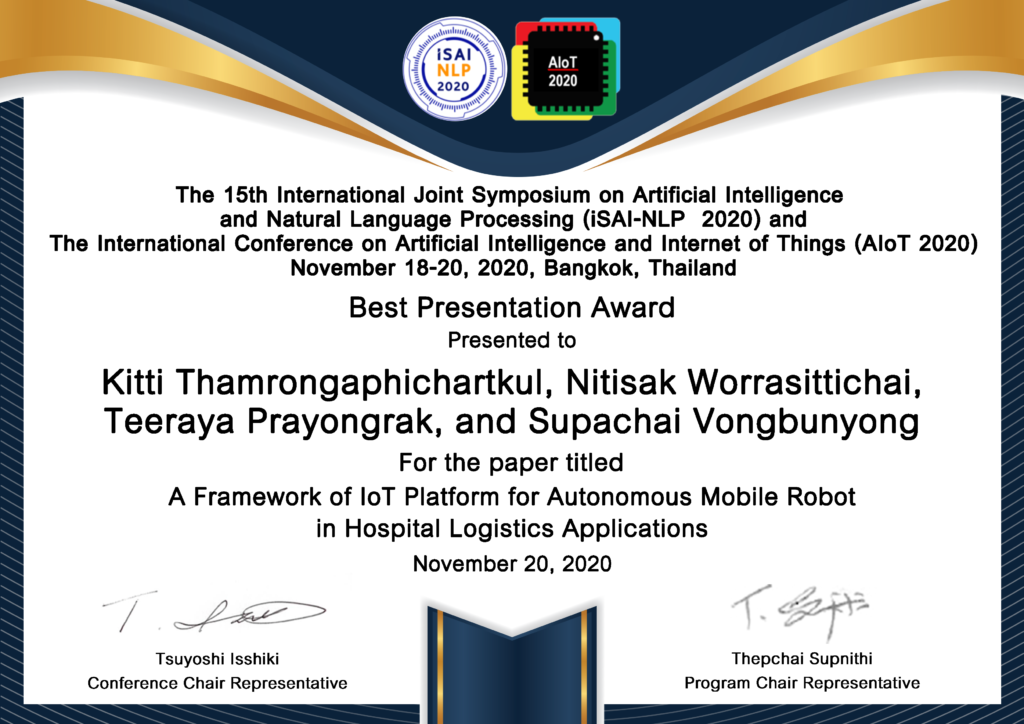
Best Presentation Awards
iSAI-WS
Chair: Thepchai Supnithi
W1-01,
An Approach of Network Analysis Enhancing Knowledge Extraction in Thai Newspapers Contexts
Akkharawoot Takhom, Dhanon Leenoi, Chotanunsub Sophaken, Prachya Boonkwan, and Thepchai Supnithi
iSAI-01 (NLP,4R) (+1P)
Chair: Ponrudee Netisopakul
iSAI-NLP-AIoT2020-0151
Can Tweets predict ICO success? Sentiment Analysis for Success of ICO Whitepaper: evidence from Australia and Singapore Markets
Anchaya Chursook, Nathee Naktnasukanjn, Somsak Chaimaim, Piyachat Udomwong, Jutharut Chatsirikul, and Nopasit Chakpitak
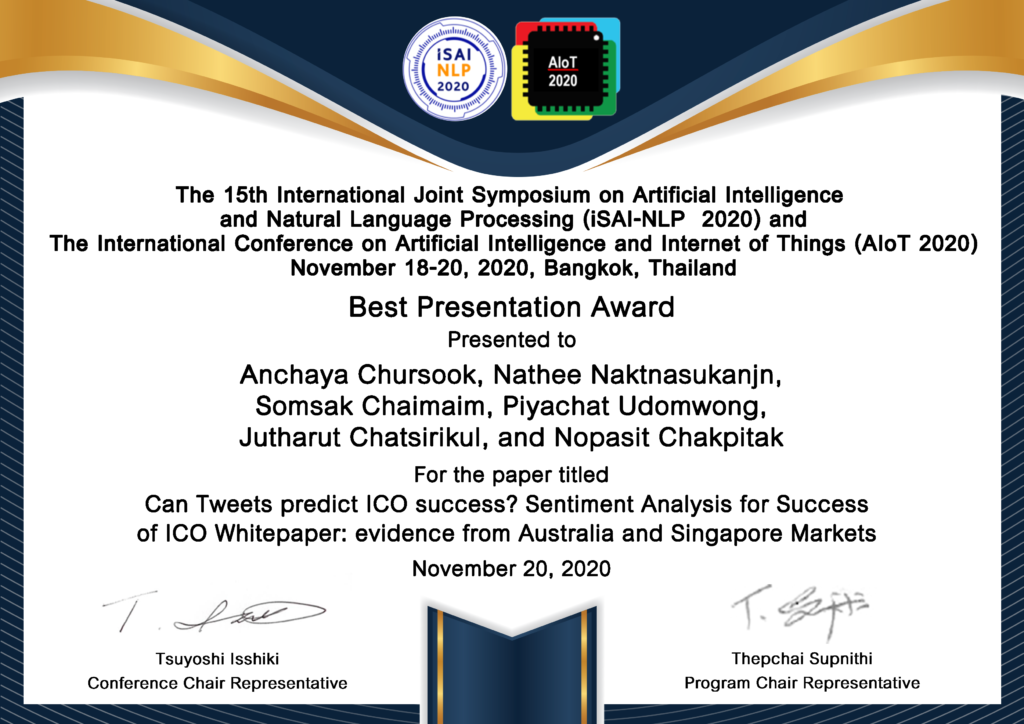
iSAI-02 (Signal, 6R) (+1P)
Chair: Narit Nhoohom
iSAI-NLP-AIoT2020-0140
Estimation of Oil Content in Oil Palm Fresh Fruit Bunch by Its Surface Color
Sutat Sae-Tan
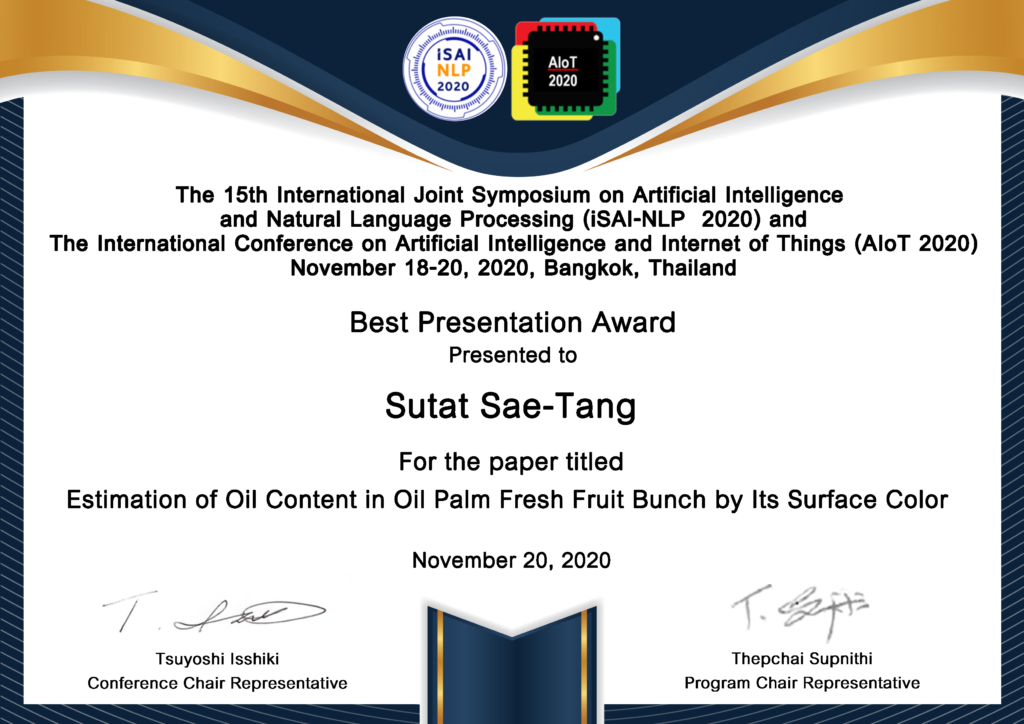
iSAI-03 (DA & ML, 4R1S) (+1P)
Chair: Konlakorn Wongpatikaseree
iSAI-NLP-AIoT2020-0170
Feature Extraction with SHAP Value Analysis for Student Performance Evaluation in Remote Collaboration
Mako Komatsu, Chihiro Takada, Chihiro Neshi, Teruhiko Unoki, and Mikifumi Shikida
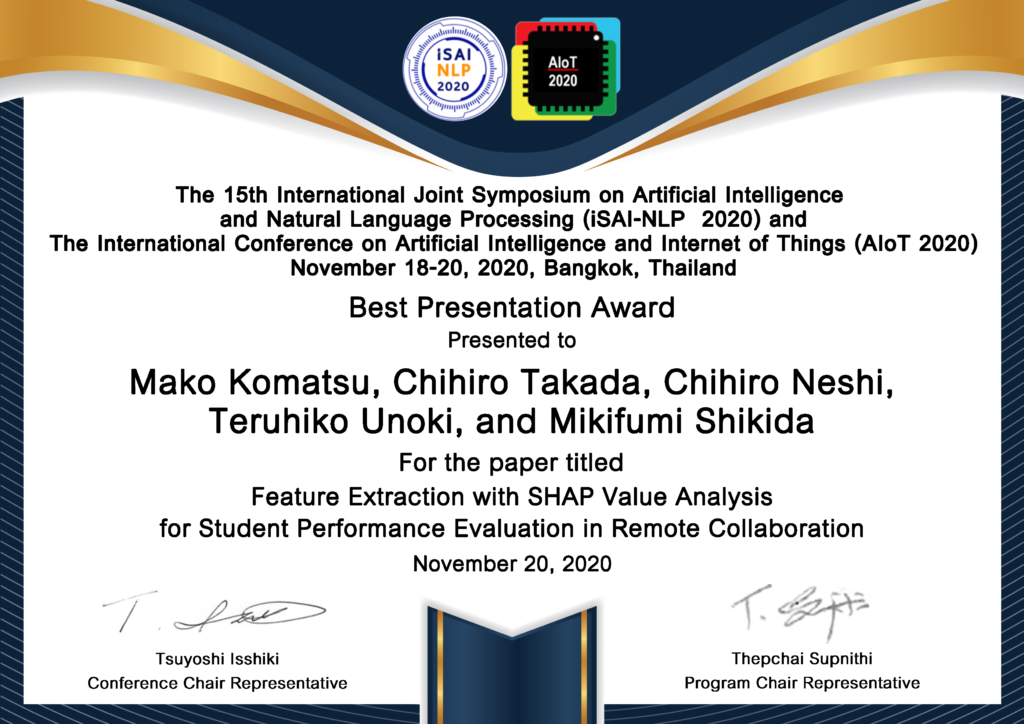
iSAI-04 (NLP, 5R1S)
Chair: Rachada Kongkachandra
iSAI-NLP-AIoT2020-0165
A Machine Learning Approach for the Classification of Methamphetamine Dealers on Twitter in Thailand Punnavich Khowrurk and Rachada Kongkachandra
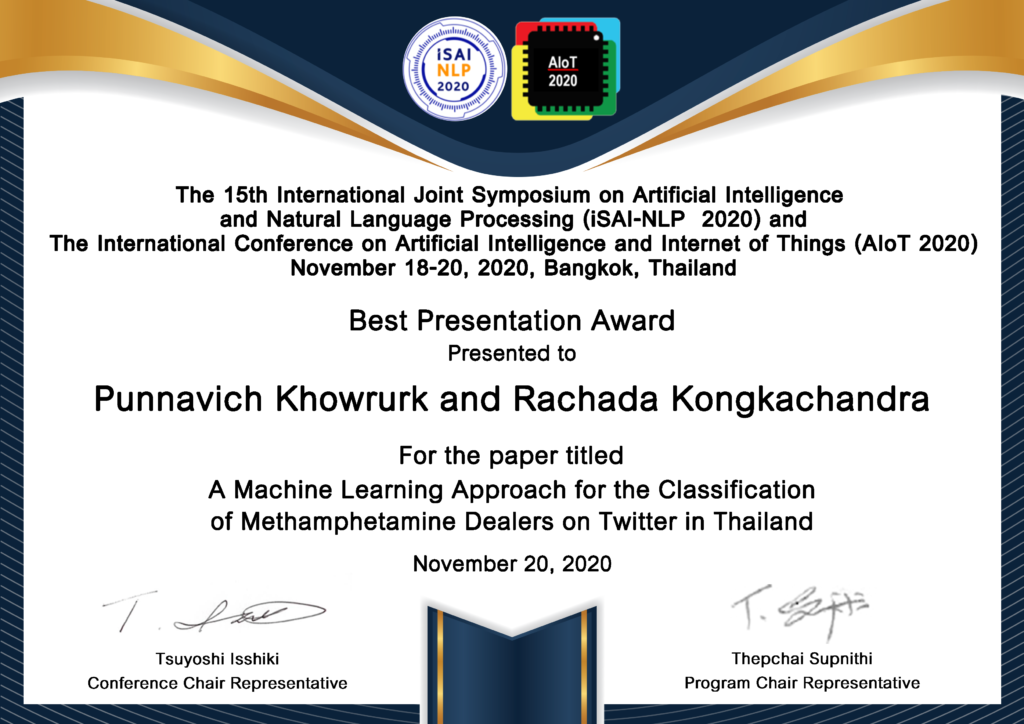
iSAI-05 (Robot, 5R2S) (+2P)
Chair: Denchai Worasawate
iSAI-NLP-AIoT2020-0174
A proposal of evaluation method using a pressure sensor for supporting auscultation training
Yuki Kodera, Kunimasa Yagi, and Mikifumi Shikida
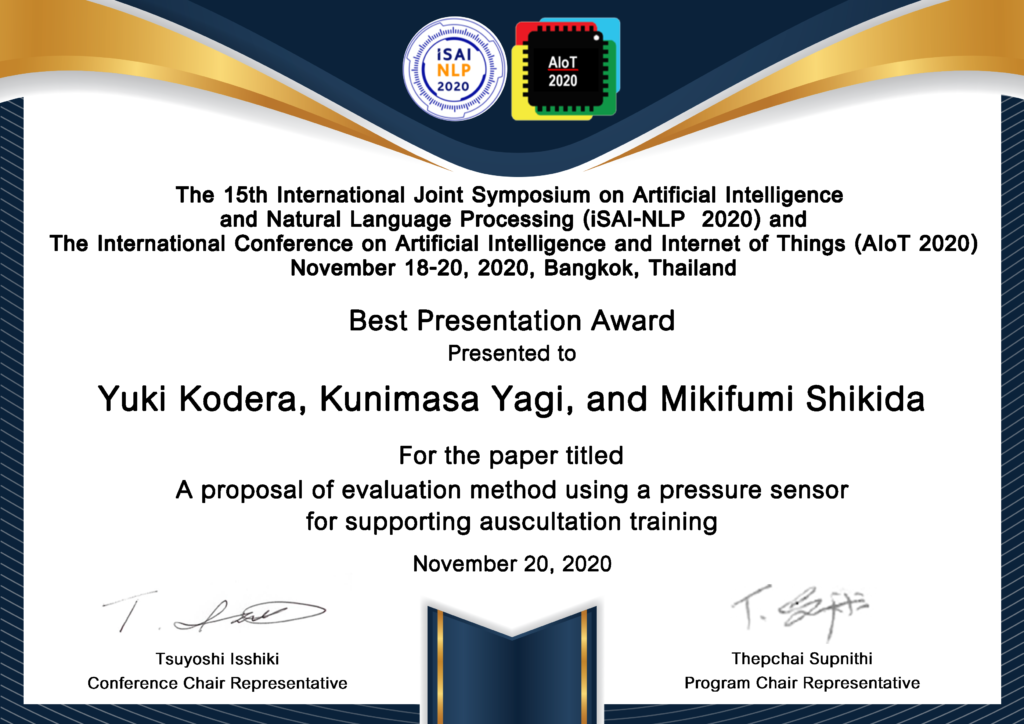
iSAI-06 (Smart, 7R) (+2P)
Chair: Thaweesak Yingthawornsuk
iSAI-NLP-AIoT2020-0173
A Framework of IoT Platform for Autonomous Mobile Robot in Hospital Logistics Applications
Kitti Thamrongaphichartkul, Nitisak Worrasittichai, Teeraya Prayongrak, Supachai Vongbunyong
iSAI-07 (DA & ML,2R) (+3P) + iSAI-08 (Signal, 4R1S) (2R1S) (+1P)
Chair: Sanparith Marukatat
iSAI-NLP-AIoT2020-0138 (Short)
COVID 19 X-Ray Image Classification using Voting Ensemble CNNs Transfer Learning
Phuwadol Viroonluecha, Thanwarat Borisut, and Jose Santa
The ONLINE system is Google Meet (Click to get the link)
The Google Meet links
Time will base on Thailand’s time (ICT/UTC+7).
Day 1 Room A + Opening Ceremony: ISAI-NLP-AIoT 2020 and IMC-AETM 2020 ONLINE
Date: November 18, 2020
Time: 10:30 – 17:00
https://meet.google.com/ucy-uqav-nsj
Day 1 Room B: ISAI-NLP-AIoT 2020 and IMC-AETM 2020 ONLINE
Date: November 18, 2020
Time: 14:30 – 17:00
https://meet.google.com/bhx-axom-tvw
Day 1 Room C: ISAI-NLP-AIoT 2020 and IMC-AETM 2020 ONLINE
Date: November 18, 2020
Time: 14:30 – 17:00
https://meet.google.com/uac-krzw-mvc
Day 1 Room D: ISAI-NLP-AIoT 2020 and IMC-AETM 2020 ONLINE
Date: November 18, 2020
Time: 14:30 – 17:00
https://meet.google.com/fss-swxg-emg
————-
Day 2 Room A + Keynote Speech II (iSAI-NLP-AIoT): ISAI-NLP-AIoT 2020 and IMC-AETM 2020 ONLINE
Date: November 19, 2020
Time: 8:00 – 17:00
https://meet.google.com/hku-vgdd-jtb
Day 2 Room B: ISAI-NLP-AIoT 2020 and IMC-AETM 2020 ONLINE
Date: November 19, 2020
Time: 10:00 – 17:00
https://meet.google.com/njm-uuno-gsn
Day 2 Room C: ISAI-NLP-AIoT 2020 and IMC-AETM 2020 ONLINE
Date: November 19, 2020
Time: 10:00 – 17:00
https://meet.google.com/tmv-httx-hmz
Day 2 Room D + Keynote Speech II (IMC-AETM): ISAI-NLP-AIoT 2020 and IMC-AETM 2020 ONLINE
Date: November 19, 2020
Time: 8:00 – 17:00
https://meet.google.com/cgt-nfnm-ghs
————-
Day 3 Room A : ISAI-NLP-AIoT 2020 and IMC-AETM 2020 ONLINE
Date: November 20, 2020
Time: 8:00 – 10:00
https://meet.google.com/juh-ztgm-ihv
Day 3 Room B : ISAI-NLP-AIoT 2020 and IMC-AETM 2020 ONLINE
Date: November 20, 2020
Time: 8:00 – 10:00
https://meet.google.com/vva-qdqn-yua
Day 3 Room C : ISAI-NLP-AIoT 2020 and IMC-AETM 2020 ONLINE
Date: November 20, 2020
Time: 8:00 – 10:00
https://meet.google.com/nei-tkpn-czi
Day 3 Room D : ISAI-NLP-AIoT 2020 and IMC-AETM 2020 ONLINE
Date: November 20, 2020
Time: 8:00 – 10:00
http://meet.google.com/pob-rpsc-qnb
Update! Conference Venue
Even though COVID-19 is currently stable and under control in Thailand, iSAI-NLP 2020 and AIoT 2020 would remain an online conference that will take place virtually, based on the Bangkok, Thailand time zone of UTC +7.
COVID-19 Planning
We remain optimistic that AI Week 2020 will proceed as planned in Bangkok in November. However, given the current fluidity of the situation, we cannot at this time predict what will happen. We assure you that we are planning for every eventuality and following how other conferences are dealing with it.
Get to know COVID-19
- It is the disease caused by the novel coronavirus. Patients may have fever with respiratory symptoms – cough, runny nose, sore throat or difficulty breathing. It can even be fatal if the symptoms are severe.
- Route of Transmission: Human-Human transmission through droplets from coughing and sneezing of infected person and close contact with COVID-19 cases.
- Incubation period: 2-14 days
Self-Protection for Tourists
On 30 January 2020, the World Health Organization announced that the COVID-19 epidemic is a Public Health Emergency of International Concern (PHEIC) but has not made any announcements on travel restrictions.
Thailand announced to list COVID-19 as the 14th dangerous communicable disease under the Communicable Diseases Act B.E. 2558 on 29 February 2020 and made an announcement on 5 March 2020 that People’s Republic of China, including special territories Macau and Hong Kong, the Republic of Korea, the Italian Republic and the Islamic Republic of Iran are Disease Infected Zones.
• Advise people to avoid travel to the Disease Infected Zones (if travel is not necessary)
• If people need to travel to areas with ongoing outbreak, they should avoid crowded areas or polluted areas, should not make close contact with patients who are sneezing and coughing, and should wear hygienic masks.
• Avoid going to the hospital (if not necessary)
• Eat clean and fully cooked food i.e. meat, eggs and vegetables
• Wash hands with water and soap for at least 20 seconds or with alcohol gel
• Refrain from touching your eyes, nose and mouth
• Do not share personal items (such as handkerchiefs, glasses and towels) with other people because the virus can enter the body via secretions of infected people.
• Keep your body warm and get enough sleep.
• Within 14 days of entry to Thailand, if you have fever and respiratory symptoms such as cough, sore throat, runny nose and shortness of breath, you should wear a hygienic mask, wash hands and meet medical practitioners or public health officers immediately and inform them of your travel history because pneumonia complications can occur and severe symptoms may cause death.
• If you have any questions, you can ask the Department of Disease Control (DDC) hotline: 1422
Measures for people traveling from abroad into Thailand
1. Closures of all Points of Entry into the Kingdom by air, water, or land
2. The people who can travel to Thailand are as follows:
• An exempted person, as prescribed or permitted pertaining to necessity by the Prime Minister or Chief Official responsible for remedying the emergency situation whereby conditions and timeframes may also be prescribed;
• Carriers of necessary goods, who shall promptly depart after completing their mission;
• Vehicle operators and crew members of vehicles, who need to enter into the Kingdom pursuant to their mission, with a clear scheduled time of departure;
• Persons on diplomatic or consular missions or under International Organizations, or representatives of the government performing their duties in Thailand, or other persons or international agencies, including their families, that the Ministry of Foreign Affairs gives permission pertaining to necessity, shall apply for documents as described in Section 3;
• Non-Thai nationals who have work permits or have been granted permission from government agencies to work in the Kingdom, and who shall also comply with Section 3;
• Thai nationals who shall apply for a certificate of entry into the Kingdom from the Royal Thai Embassy or the Royal Thai Consulate in their country of residence, (or/and – which conjunction is it? If they only have a letter and no certificate, can they enter? Also how is the medical certificate different from the Fit to Fly Health Certificate?) has a medical certificate, and who shall comply with Section 3;
3. Persons granted with an exemption or relaxation must have a Fit to Fly Health Certificate which has been certified or issued no more than 72 hours before travelling;
4. Upon entry into the Kingdom, people must also strictly comply with disease prevention measures prescribed by the Government
https://ddc.moph.go.th/viralpneumonia/eng/ind_traveltoeng.php
Hello world!
Welcome to WordPress. This is your first post. Edit or delete it, then start writing!
